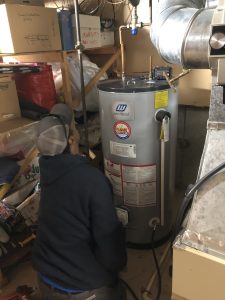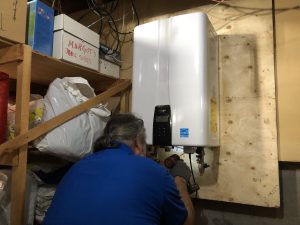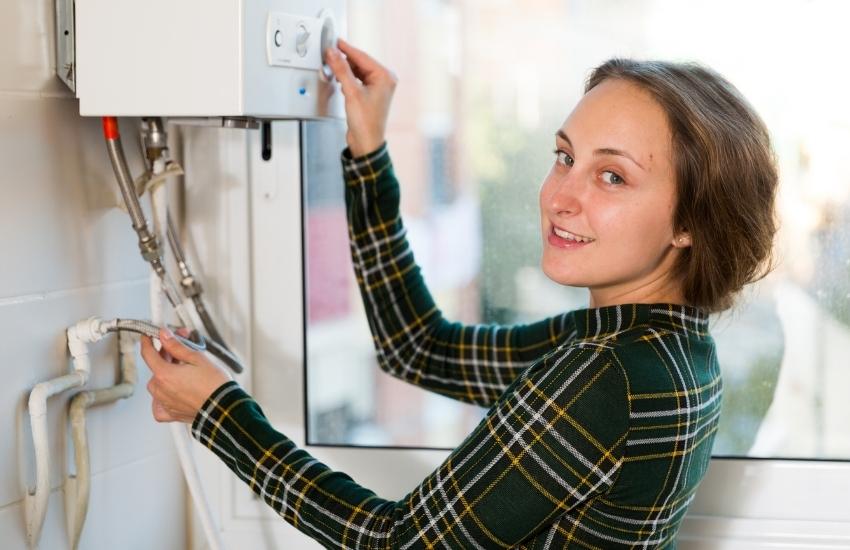So, “How long do water heaters last?” About 10 years for a hot water tank or as many as 20 years for a tankless water heater.
Although this life expectancy is not set in stone, it is important to have a general idea of how long your existing water heater should last. This is useful information when you need to decide whether to repair or replace your water heater. Looking at the serial number can help you best determine the age of your water heater, but it does depend on the brand.
It makes you aware of when your water heater is at an age where a breakdown is more likely, so you can be extra vigilant for warning signs of trouble ahead signifying a time to replace your water heater before you have a leaking water heater on your hands.
So here’s the long answer. How long does the average water heater last, and what problems may signal that it’s nearing the end of its useful life?
How Long Do Hot Water Heaters Last?
Hot water heaters experience a lot of wear and tear. They heat up cold water and continuously maintain the temperature of water stored in the tank so it is ready whenever needed. It will probably be 10-12 years before you have to replace a water heater.
However, the average lifespan varies according to:
- Amount of use
- Local water quality — hard water causes mineral deposits to build in the tank and an electric heater’s heating element, while overly soft water can corrode the interior lining of the tank on classic tank water heaters.
- Quality of installation
- How well you maintain it — for example, annual flushing will take the corrosive particles and hard water buildup and save you from a broken heating element.
- Water heater sizing — the wrong sized water heater can cause it to overwork and break earlier.
A little of what might be called “the luck of the draw” comes into the picture as well. If you find sediment builds quickly in your tank, you may want to look into a water softener. It is also a good time to check for any hot water heater leaks or water pooling near the unit.
How Long Will Tankless Water Heaters Last?

A tankless water heater can last up to 20 years before it needs to be replaced. This is because they don’t have the added burden of keeping water constantly hot. Similar to hot water tanks, tankless water heaters benefit from regular maintenance, such as flushing to remove mineral sediment.
Your old water heater uses heating elements to keep your big tank at the desired temperature, ready for you to use it. The bigger the water heater tank, the more hot water you’ll have before you’re showering with cold water. This also means your hot water heater needs to keep a big tank hot enough, all the time- that is a lot more wear and tear than a tankless water heater. If your old tank water heater is on its last legs, we highly recommend that your new water heater be a new model tankless water heater.
Common Hot Water Heater Issues

Keep an eye out when your water heater stops working properly. All of the issues listed below are potential trouble signals. In some cases, you’ll be able to resolve the situation yourself, but most of these problems are best taken care of by a professional. Never neglect them, though. Left unrepaired, they could lead to serious trouble and even shorten your water heater’s lifespan.
1. Hot Water Is Too Hot
When your water is unexpectedly hotter than you would like, first check the water heater thermostat. Has it, unbeknownst to you, been reset to a higher temperature? If not, either your pressure relief valve is blocked or heavy sediment buildup forces the burner to overheat.
2. Hot Water Is Not Hot Enough
When your hot water is only lukewarm, once again, see whether the thermostat is at fault here. Other possible causes include mineral buildup (always bad for your water heater) or damage to your immersion heater or dip tube.
3. Water Heater Leaking
Get ready for a bit of detective work if you see water on the floor near the water heater. It may be from your furnace, air conditioner condensate line, whole house humidifier, or even an open window. If your water heater seems like the most likely source, turn off the water supply and the electrical breaker (for an electric hot water heater) or the gas valve (for a gas water heater).
Then figure out the location of the leakage. Tighten the water inlet and outlet fittings. Inspect the drain valve, turn down the water temperature, and check water pressure with a pressure gauge. Usually, water leaking from the bottom of the tank indicates the most severe problem; consult Hot Water Ottawa for an expert inspection.
4. Noisy Water Heater
Strange water heater noises are frequently a cry for help from a water tank that needs attention NOW. For example, sizzling may be due to water dripping onto the burner in an electric heater, restricted water flow, or active leakage. Popping and rumbling sounds signal that a heavy coating of sediment has built up, reducing efficiency and increasing the threat of leaks. If you get expert water heater maintenance right away, you may be able to save it.
5. Hot Water Looks Brown
When your warm water is coming out brown, first check whether the issue occurs only with the hot faucet, not with the cold water. If that’s the case, then the discolouration is probably due to brownish rust inside your water heater. Flushing the tank may save it, but if your heater is near the end of its service life, replacing your water heater should be high on your priority list.
6. Water Heater Keeps Turning Off
There are various reasons for water heaters keep turning off, ranging from straightforward problems that are easily solvable to more intricate and potentially hazardous issues. A typical reason for a water heater shutting off is a malfunctioning thermostat. When the thermostat fails to operate correctly, it may not recognize the water temperature accurately, leading to the heater turning off prematurely.
How To Extend The Life Of Your Water Heater
Simple: Regular Water Heater Maintenance
To avoid excess water heater repair or early water heater replacement, regular water heater maintenance is the key. Here are a few of things our water heater technicians do to keep water heaters in tip top condition.
Flush Your Water Heater
Tankless water heaters have a longer life expectancy than tankless water heaters, mostly because they don’t have the wear of continually heating water that is sitting in the water heater tank. This means sediment buildup is more frequent than a tankless water heater as well.
Anode Rod
Ottawa has hard water. The Anode rod’s job is to prevent the water heater tank from rusting. It attracts all of the mineral deposits and corrosion so the anode rod rusts and needs replacing before the tank itself. Rust and corrosion are the demise of most tank water heaters. As we said above, flushing water heaters will help prevent build-up, but if your anode rod is fully corroded, the next thing to go will be the steel tank itself.
Pressure Valve
Your pressure relief valve is what prevents your hot water heater from exploding. It automatically releases pressure as it builds in your tank, so if there is an issue with the valve it needs to be replaced immediately. Lift the lever on the valve- if no hot water comes out, something is wrong.
Schedule an Annual Water Heater Tune-Up
Keep your water heater tank in top shape to get the most out of the life of your water heater. Rely on Hot Water Ottawa for skilled water heater installation, water tank repair, and inspection. And when it’s finally time to replace your water heater, contact us to install a high-quality new water heater.
